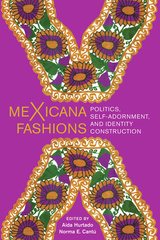Beyond Machismo
Intersectional Latino Masculinities
Long considered a pervasive value of Latino cultures both south and north of the US border, machismo—a hypermasculinity that obliterates any other possible influences on men’s attitudes and behavior—is still used to define Latino men and boys in the larger social narrative. Yet a closer look reveals young, educated Latino men who are going beyond machismo to a deeper understanding of women’s experiences and a commitment to ending gender oppression. This new Latino manhood is the subject of Beyond Machismo.
Applying and expanding the concept of intersectionality developed by Chicana feminists, Aída Hurtado and Mrinal Sinha explain how the influences of race, class, ethnicity, sexuality, and gender shape Latinos’ views of manhood, masculinity, and gender issues in Latino communities and their acceptance or rejection of feminism. In particular, the authors show how encountering Chicana feminist writings in college, as well as witnessing the horrors of sexist oppression in the United States and Latin America, propels young Latino men to a feminist consciousness. By focusing on young, high-achieving Latinos, Beyond Machismo elucidates this social group’s internal diversity, thereby providing a more nuanced understanding of the processes by which Latino men can overcome structural obstacles, form coalitions across lines of difference, and contribute to movements for social justice.
I very much enjoyed reading Hurtado and Sinha's Beyond Machismo for both academic and personal reasons. I appreciate their attention to theory as well as the intersectional analyses presented throughout the book. Most of all, I appreciate the book's message that we, as scholars, should lead the charge in dismantling the chains of machismo that so often constrain young Latino men.
A trailblazing analysis on the emergence of a new Latino manhood—one that is intersectional and feminist…This is the manner in which Hurtado and Sinha make a revolutionary contribution to the study of masculinities: that Latino feminist men exist.
Beyond Machismo disrupts prevailing notions of Latino masculinites using a Chicana feminist Intersectional Theory to understand how educated Latino men develop a feminist consciousness and seek to dismantle patriarchy…We implore readers to converge on Hurtado and Sinha's intellectual glorieta and reconsider how their research, policy, and practices can help others think beyond machismo.
What Gloria Anzaldua’s canonical book Borderlands/La Frontera: The New Mestiza did for Chicanas—provide a framework for understanding Chicana identities, politics, and epistemologies—Beyond Machismo will do for Latino males. This is a brilliant book.
- List of Tables
- Preface
- Acknowledgments
- Preface
- Introduction
- Chapter 1. Beyond Machismo: The Research Context
- Chapter 2. Chicana Intersectional Understandings: Theorizing Social Identities and the Construction of Privilege and Oppression
- Chapter 3. Toward New Masculinities: A Chicana Feminist Intersectional Analysis of Latinos’ Definitions of Manhoods
- Chapter 4. The Latino/a Gendered Educational Pipeline: Vulnerabilities and Assets in Pathways to Achievement
- Chapter 5. Relating to Feminisms: Intersectionality in Latino and White Men’s Views on Gender Equality
- Chapter 6. Relating to Oppression: Intersectionality in Defining Latino Men’s Views on Chicana Feminisms
- Chapter 7. Intersectionality at Work: Regression, Redemption, Reconciliation
- Appendix: Seven Stages of Conocimiento, by Gloria Anzaldúa
- Notes
- Works Cited
- Index







